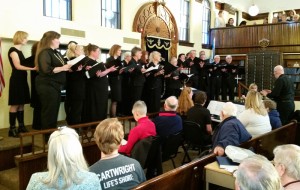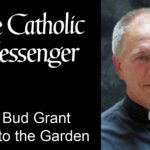By Barb Arland-Fye
Editor
Tom Shadonix hoped to someday direct the Holocaust Cantata, a powerful, haunting choral tribute to the six million Jews and millions of other victims of Hitler’s Holocaust.

Members of the Ottumwa Area Community Chorus perform the Holocaust Cantata on March 29 at B’nai Jacob Synagogue in Ottumwa. Parishioners from St. Mary of the Visitation in Ottumwa and St. Mary in Albia were among the chorus members.
The time arrived Palm Sunday, when he directed the Ottumwa Area Community Chorus in a standing-room-only performance at B’nai Jacob Synagogue in Ottumwa. Tom also serves as music director of St. Mary of the Visitation Parish in Ottumwa; some of the parishioners from that parish and St. Mary’s in Albia performed in the chorus.
“Barb, this overwhelmingly sad but beautiful music tribute to the souls who either perished or were liberated from the living hell of the (concentration) camps was a moving way to begin Holy Week,” Sister Donna Donovan, CHM, wrote to me. “The synagogue was filled to capacity – and then some! The high school students of the area attended as a class activity. I’m sure nobody will ever forget this performance!”
Tom echoed her sentiments in a phone call between music lessons this week. “I would gather up the choir, the pianist and cellist and do it again in a minute. And they would, too.”
Composer David McCullough premiered the Holocaust Cantata on March 17, 1998, at the John F. Kennedy Center for the Performing Arts. Lyrics of the cantata’s “Songs from the Camps” come from the songs and music of prisoners in the death camps, along with letters, diaries, poetry, graffiti and other writings, Tom said. Liberators of the camps found these writings, now housed in the U.S. Holocaust Memorial Museum in Washington, D.C. The writings were translated from their original Polish for the cantata, which is performed in 13 movements that alternate between music and readings.
“Basically, people think all of the individuals in concentration camps would have been very depressed and down because all they saw day after day was death and dying,” said Harvey Disenhouse of B’nai Jacob Synagogue. “That wasn’t the case; remarkably they stayed fairly hopeful. A lot of the people wrote poetry and stories that were preserved.”
Disenhouse, president of B’nai Jacob’s board of directors, said the Ottumwa Area Community Chorus approached his congregation about the possibility of performing the Holocaust Cantata in the synagogue. The answer, of course, was yes. “They just did an outstanding job,” he added.
The timing of the event was a godsend. This year marks the 70th anniversary of the liberation of the Auschwitz concentration camp and the 100th anniversary of the Ottumwa synagogue.
Tom hadn’t been aware of the Auschwitz anniversary until ordering the music for the chorus to perform and had to be patient with a six-week back order. But the music arrived in plenty of time for the chorus to rehearse at St. Mary of the Visitation and also at the synagogue. All together, 25 singers, a cellist and a pianist performed before an audience of 320 people.
“I had to stand in the aisle to direct and watch my gestures so I wouldn’t hit anybody,” Tom said. He describes the event as “just magnificent. The choir sang beautifully and so movingly that when we were done, no one clapped for about two minutes, and then they roared with applause.”
Tom says he gauges the success of a concert on how long he continues to hear it in his mind’s ear. “Sometimes I’m ready to get on to the next one. This one, I have not been able to shake.”
Next time he directs a Holocaust Cantata, I plan to be in the audience.











